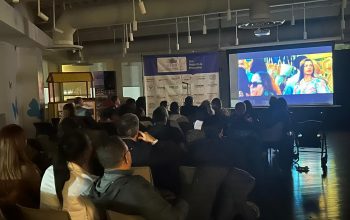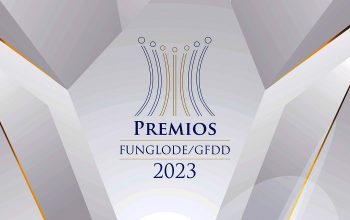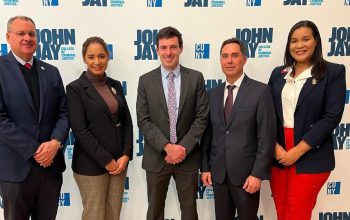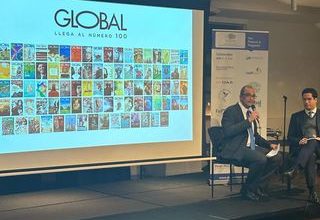news
GFDD Fellows Present Climate Change Adaptation Research Findings through Book Launch Event at University of Rhode Island
October 29, 2015
In the third and final installment of the release of the latest publication in the series, Research and Ideas, entitled, “Climate Change in the Dominican Republic: Impact on Coastal Resources and Communities,” the Fellows Program of the Global Foundation for Democracy and Development (GFDD) invited GFDD Fellows Hilary Lohmann and Mat Rosa to give a special presentation of their research findings at their alma mater, the University of
Rhode Island (URI) on October 29, 2015. The presentations were followed by a panel discussion and Q & A with the Fellows and an expert in the field, Donald Robadue, Senior Coastal Manager at the University’s Coastal Resources Center (CRC).
Marc Jourdan, GFDD UN Representative, gave the words of welcome, introduced the speakers, and moderated the panel on behalf of GFDD.
Fellows Program researcher, Hilary Lohmann, presented the findings
of her study, which was conducted in the summer of 2014 along the coastal areas of Montecristi, Samaná, Boca Chica, and La Caleta, by surveying direct and indirect users of resources that come from the sea. In her presentation, Lohmann explained that, “It is important to consider all stakeholders in a given location or community when looking at adaptation policies, as all of them are interacted when viewed through a wider lens.”
Mat Rosa, a 2014 spring Fellow, presented his research on the governance profiles of institutional arrangements for climate change adaptation, which included interviews with key stakeholders and analyses of legislation and climate change adaptation plans for coastal
resources in Santo Domingo, the capital city of the country. Rosa stated that, "Coral reefs came through in my research as the most important adaptation need for the Dominican Republic" and continued that, "There is clearly a need for community-based ecotourism training.”
Mr. Donald Robadue, PhD, shared his expertise in policy analysis, strategy development, the design and management of local and state-level coastal resources
management programs in the United States and developing countries and national programs in developing countries. He also spoke about the work of the CRC and in his presentation he mentioned that, "Coastal communities are most science minded and learned people on the topic of climate change. They are ready to address climate change. Unfortunately, it is the people above, often governments, that lack the resources to help them address the issue.”
Thanking
the panelists for their in-depth presentations, Jourdan opened the floor to questions from the audience and invited everyone to take part in further discussion and network over light refreshments to close out the successful event.
Many experts from the university were in the audience, including CRC research associate, Elizabeth McLean, who presented at the Dominican Republic publication launch event at Funglode; and the Director and Chair of the Marine Affairs Department,
Robert Thompson, among others. 2016 GFDD Fellow and URI Coastal Resources master’s candidate, Melvin Alvarez-Ortez, who will begin his in-country research next summer, was also in attendance.
About the Fellows Program
The Fellows Program, an extension of the internship and academic exchange program InteRDom, was developed in 2009 to respond to the
desire of GFDD and Funglode to develop a community of scholars that contributes to the Foundations’ growing body of research on matters of international concern that directly impact the Dominican Republic.
The Program complements the overall mission of GFDD and Funglode to promote academic exchange, generate scholarship, and influence the creation of public policy related to economic and social development both at the national and international levels.
Through the Fellows Program, GFDD and Funglode seek to generate scholarship on issues at the forefront of the United Nations’ agenda in order to give voice to national and regional concerns and offer viable solutions to domestic and international challenges.






